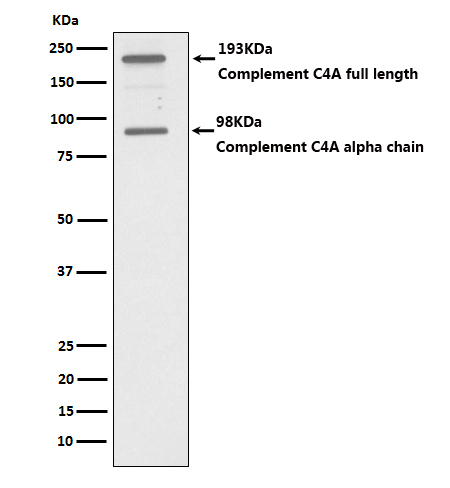Anti-C4A Monoclonal Antibody
- SPECIFICATION
- CITATIONS
- PROTOCOLS
- BACKGROUND

Application
| WB, IHC, FC |
|---|---|
| Primary Accession | P0C0L4 |
| Host | Rabbit |
| Isotype | Rabbit IgG |
| Reactivity | Human |
| Clonality | Monoclonal |
| Format | Liquid |
| Description | Anti-C4A Monoclonal Antibody . Tested in WB, IHC, Flow Cytometry applications. This antibody reacts with Human. |
| Gene ID | 720;721 |
|---|---|
| Other Names | Complement C4-A, Acidic complement C4, C3 and PZP-like alpha-2-macroglobulin domain-containing protein 2, Complement C4 beta chain, Complement C4-A alpha chain, C4a anaphylatoxin, C4b-A, C4d-A, Complement C4 gamma chain, C4A, CO4, CPAMD2 |
| Calculated MW | 192785 Da |
| Application Details | WB 1:500-1:2000 IHC 1:50-1:200 FC 1:50 |
| Contents | Rabbit IgG in phosphate buffered saline, pH 7.4, 150mM NaCl, 0.02% sodium azide and 50% glycerol, 0.4-0.5mg/ml BSA. |
| Clone Names | Clone: AFHB-3 |
| Immunogen | A synthesized peptide derived from human C4A |
| Purification | Affinity-chromatography |
| Storage | Store at -20°C for one year. For short term storage and frequent use, store at 4°C for up to one month. Avoid repeated freeze-thaw cycles. |
| Name | C4A {ECO:0000303|PubMed:6546707, ECO:0000312|HGNC:HGNC:1323} |
|---|---|
| Function | Precursor of non-enzymatic components of the classical, lectin and GZMK complement pathways, which consist in a cascade of proteins that leads to phagocytosis and breakdown of pathogens and signaling that strengthens the adaptive immune system. |
| Cellular Location | Secreted. Synapse Cell projection, axon. Cell projection, dendrite [Complement C4b-A]: Secreted. Cell surface. Note=Covalently associated with the surface of pathogens: the internal thioester bond reacts with carbohydrate antigens on the target surface to form amide or ester bonds. |
| Tissue Location | Complement component C4 is expressed at highest levels in the liver, at moderate levels in the adrenal cortex, adrenal medulla, thyroid gland, and the kidney, and at lowest levels in the heart, ovary, small intestine, thymus, pancreas and spleen (PubMed:11367523). The extra-hepatic sites of expression may be important for the local protection and inflammatory response (PubMed:11367523). |

Thousands of laboratories across the world have published research that depended on the performance of antibodies from Abcepta to advance their research. Check out links to articles that cite our products in major peer-reviewed journals, organized by research category.
info@abcepta.com, and receive a free "I Love Antibodies" mug.
Provided below are standard protocols that you may find useful for product applications.
If you have used an Abcepta product and would like to share how it has performed, please click on the "Submit Review" button and provide the requested information. Our staff will examine and post your review and contact you if needed.
If you have any additional inquiries please email technical services at tech@abcepta.com.













 Foundational characteristics of cancer include proliferation, angiogenesis, migration, evasion of apoptosis, and cellular immortality. Find key markers for these cellular processes and antibodies to detect them.
Foundational characteristics of cancer include proliferation, angiogenesis, migration, evasion of apoptosis, and cellular immortality. Find key markers for these cellular processes and antibodies to detect them. The SUMOplot™ Analysis Program predicts and scores sumoylation sites in your protein. SUMOylation is a post-translational modification involved in various cellular processes, such as nuclear-cytosolic transport, transcriptional regulation, apoptosis, protein stability, response to stress, and progression through the cell cycle.
The SUMOplot™ Analysis Program predicts and scores sumoylation sites in your protein. SUMOylation is a post-translational modification involved in various cellular processes, such as nuclear-cytosolic transport, transcriptional regulation, apoptosis, protein stability, response to stress, and progression through the cell cycle. The Autophagy Receptor Motif Plotter predicts and scores autophagy receptor binding sites in your protein. Identifying proteins connected to this pathway is critical to understanding the role of autophagy in physiological as well as pathological processes such as development, differentiation, neurodegenerative diseases, stress, infection, and cancer.
The Autophagy Receptor Motif Plotter predicts and scores autophagy receptor binding sites in your protein. Identifying proteins connected to this pathway is critical to understanding the role of autophagy in physiological as well as pathological processes such as development, differentiation, neurodegenerative diseases, stress, infection, and cancer.



